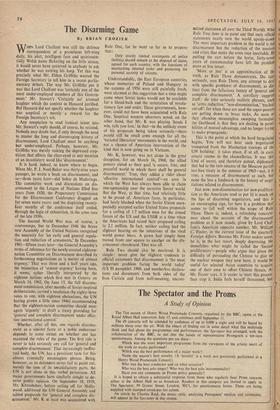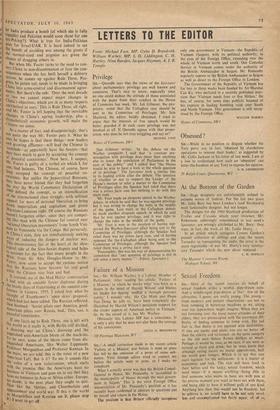The Disarming Game
By BRIAN CROZIER
WHEN Lord Chalfont was still the defence correspondent of a prominent left-wing daily, his alert, intelligent face and quintessen- tially Welsh name flickering on the little screen, it Would never have occurred to anybody to ask
whether he was earning his keep. Yet this was precisely what Mr. Eldon Griffiths wanted the Foreign Secretary to tell him in a recent parlia- mentary debate. The way Mr. Griffiths put it was that Lord Chalfont was 'certainly one of the most under-employed members of this Govern- ment.' Mr. Stewart's 'Certainly no' aroused laughter which the context in Hansard justified. But Hansard did not specify whether the laughter was sceptical or merely a reward for the Foreign Secretary's wit.
Any temptation to read ironical intent into Mr. Stewart's reply should, of course, be resisted.
Nobody may doubt that, if only through the need to master the long and discouraging history of disarmament, Lord Chalfont must be anything but under-employed. Perhaps, however, Mr. Griffiths was merely voicing the depressed scep- ticism that affects the clear-eyed at any mention of an incantatory word like 'disarmament.'
It is hard, indeed, to know where to begin.
When Mr. P. J. Noel-Baker was thirty-nine years younger, he wrote a book on disarmament, and so—three years later—did Senor de Madariaga. The committee work and discussions on dis- armament in the League of Nations filled five years from 1920, the Preparatory Commission for the Disarmament Conference dragged on for seven more years; and the dispiriting twenty- four months of the conference itself ended, through the logic of exhaustion, in the arms race of the late 1930s.
The Second World War was, of course, a contretemps, but in December 1946 the brave new Assembly of the United Nations recognised the necessity for 'an early and general regula- tion and reduction of armaments.' In December 1961—fifteen years later—the General Assembly's terms of reference for the newly-created eighteen- nation Committee on Disarmament described its forthcoming negotiations as 'a matter of utmost urgency.' That was three and a half years ago, the injunction of 'utmost urgency' having been, it seems, rather liberally interpreted by the eighteen nations which first met in Geneva on March 14, 1962. On June 15, the full disarma- ment commission, after months of Soviet-inspired deliberations, carried a resolution (by eighty-three votes to one, with eighteen abstentions, the UN having grown a little since 1946) recommending that the eighteen-nation committee should meet again 'urgently' to draft a treaty providing for 'general and complete disarmament under effec- tive international control.'
Whether, after all this, one regards disarma- ment as a sinister farce or a noble endeavour depends to some extent on whether one has mastered the rules of the game. The first rule is never to take seriously any call for 'general and complete disarmament.' That increasingly ineffec- tual body, the UN, has a persistent taste for this almost criminally meaningless phrase. Being, however, as its defenders never fail to point out, merely the sum of its unsatisfactory parts, the UN is not alone in this verbal perversion. All major governments have similarly sought to de- ceive public opinion. On September 18, 1959, Mr. Khrushchev, before setting off for Holly- wood, addressed the UN General Assembly and tabled proposals for 'general and complete dis- armament.' Mr. K at least was acquainted with Rule One, for he went so far as to propose that : Only strictly limited contingents of police (militia) should remain at the disposal of states, agreed for each country, with the functions of maintaining internal order and protecting the personal security of citizens.
Understandably, the East European countries, whose memories of Poland and Hungary in the autumn of 1956 were still painfully fresh, were alarmed at this suggestion that a time might come when Soviet tanks would not be available for a blood-bath and the restoration of revolu- tionary law and order. These governments, how- ever, could not have been acquainted with Rule One. Sceptical western observers noted, on the other hand, that Mr. K was playing 'heads I win, tails you lose,' in that—in the unlikely event of his proposals being taken seriously—there ,would still be small arms enough for all the 'national liberation' movements in the world, and not a chance of American intervention of the kind that is now going on in Vietnam.
Mr. K, however, was not alone in the great deception, for on March 16, 1960, the allied powers stated as their goal 'a secure, free, and peaceful world in which there shall be general disarmament.' True, they added a rider about 'effective international contra—an area in which the West has always been able to claim one-upmanship over the secretive Soviet world. But the West, at that time, had relatively little to be proud of. American faces, in particular, had lately blushed when the Soviet Union unex- pectedly accepted earlier United States proposals for a ceiling of 1.7 million men for the armed forces of the US and the USSR at a time when the Americans had raised their proposed ceiling to 2.1 million. In fact, neither ceiling had the slightest bearing on the intentions of the rival world power blocs. A pawn had simply been moved from one square to anotller on the dis- armament chessboard. That was all.
Rule Two should also be mastered. It is simple: never give the slightest credence to official statements that disarmament is 'the most important problem facing the world today' (US IS pamphlet, 1960, and numberless declara- tions and documents from both sides of the Iron Curtain and from well-meaning, uncom-
mitted statesmen all over the Third World). What Rule Two does is to point out that such official statements neatly turn the world upside-down. The most important problem in the world is not disarmament but the reduction of the tensions and crises that make the arms race inevitable. BY putting the cart before the horse, forty-seva years of statesmanship have left the probleal more or less intact.
'More or less' is an approximation of the truth, as Rule Three demonstrates. Do take seriously, says Rule Three, any attempt to deal with specific problems of disarmament, as dis- tinct from the fallacious lunacy of 'general and complete disarmament.' A corollary suggests itself: do take seriously realistic phrases, such as 'arms reduction,' non-dissemination,"nucleat cut-off'; for when these are used the super-powers are getting down to brass tacks. As soon as they abandon meaningless sweeping formulae, the likelihood is that they are dealing in possi- bilities of mutual advantage, and no longer trying to make propaganda.
This is the point at which the hard bargaining begins. You will not hear such negotiation trumpeted from the Manhattan treetops of the UN building: it takes place, if at all, in cosy, ornate rooms in the chancelleries. It was this kind of secret, and therefore potent, diplomacY that led to the rare success of the Moscow partial test-ban treaty in the summer of 1963—not, it is true, a measure of disarmament as such, but none the less a landmark in the history of negu- tiations related to disarmament.
Just now, non-dissemination (or non-prolifera- tion as the Americans tend to put it) is much on the lips of disarming negotiators, and this is an encouraging sign, for here is a problem that seems to fall well within the scope of Rule Three. There is, indeed, a refreshing concrete- ness about the account of the disarmament problem as it now stands, given by Lord Chal. font's American opposite number, Mr. Williafli C. Foster, in the current issue of the quarterlY Foreign Affairs. Because Mr. Foster makes sense, he is, in the last resort, deeply depressing. He demolishes what might be called the 'limited proliferators'—people who argue that given the difficulty of persuading the Chinese to give uP the nuclear weapon they now have, it would be useful for selected Asian countries to acquire one of their own to offset Chinese threats. M Mr. Foster says, it is easier to start this process than stop it. India feels herself threatened, but let India Produce a bomb (of which she is fully Capable) and Pakistan would soon shout for one (ex-Peking?): What is true for India-Pakistan goes for Israel-I.JAR. It is hard indeed to see the benefit of avoiding war among the giants if the normal-sized and pygmies are given the Chance of dragging others in. But when Mr. Foster turns to the need to con- vert China to non-dissemination or face the con- sequences when she has built herself a delivery system, he comes up against Rule Three. Pro- gress, he points out, needs to be made in bringing China into arms-control and disarmament agree- nienls. But there's the rub: 'Over the next decade r two we cannot expect major changes in hina's objectives, which are in so many respects antithetical to ours.' This is Rule Three, all right, and Mr. Foster is left hoping that the inevitable e,hanges in China's ageing leadership, plus a thYPothetical) economic growth, will make the Chinese see sense.
As a matter of fact, and disappointingly, that's flat quite the way Mr. Foster puts it. What he saYs he hopes is that' these things—new leaders and growing affluence—will lead the Chinese to 'conclude—as apparently have the Soviets—that theY have much to gain by accepting the concept ,c)1 Peaceful coexistence.' Now here, I suspect, "Ir. Foster is guilty of a verbal sin which I. for iitte, find heinous. The Chinese, of course, have I°ng accepted the concept of peaceful co- e„Xistence. But unlike the hypocritical Russians, LneY have never hinted that they had forgotten tille way the World Communist Declaration of '960 defined the concept, as an intensification of the international class struggle, with militant suPPort for wars of national liberation to bring dk?wn imperialism and capitalism and prove "iarxism-Leninism right. Of course the Russians haven't forgotten either, since they are compet- i!IS like mad with the Chinese for control over national liberation movements' from South Viet- !tarn to Venezuela via the Congo. But perversely, in China's eyes, they are simultaneously seeking ..,.vslaYs of reducing the dangers of nuclear war. ;his inconsistency lies at the heart of the ideo- 'ogical side of the Sino-Soviet dispute and helps t‘r), account for the fact that many people in the „ from Sir Alec Douglas-Home to ' Mr. roster, now seem to accept the curious notion thttt the ,Russians have become fat and good While the Chinese stay lean and bad.
, it reminds me of the Mad Hatter conversation I had with an amiable Soviet diplomat during the heady days of fraternising at the summit con-
re• rence in Geneva, 1955. I asked him what he th,rnight of Eisenhower's 'open skies'. proposal, Wnieh had just been tabled. The Russian reflected, then boomed: 'Soviet pilots over America, good. American pilots over Russia, bad.; This, too, is Peaceful coexistence.
If one faces up to Rule Three, one is left with the world as it really is, with Ilerlin still divided,
a
Shooting., war on China's doorstep and the _anguished anti-American bleats of the teach-ins.
be sure, some of the bleats come from dis- nguished Americans, like Walter Lippmann, ..t.rofessor Morgenthau and Professor Kennan. In. ',he Mass, we are told, this is the voice of a new Pirnerican Left. But is it? To rile it sounds like tile voice of a new isolationism, which starts With the premise that the Americans have no L°1-!siness in Vietnam and goes on to say that they nave no business in Asia or Africa either. Europe, doubt, is the next place they ought to quit. „9W like the 'thirties, and. Chamberlain. and appeasement and world war. If this is the world
Morgenthau and Kennan see it, please stop It: 'want to get off.
•

















 Previous page
Previous page